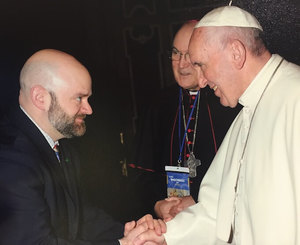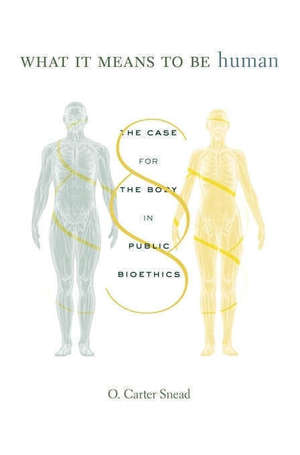Center Director

O. Carter Snead
Director, de Nicola Center for Ethics and Culture
Charles E. Rice Professor of Law
Concurrent Professor of Political Science
Professor Carter Snead is one of the world’s leading experts on public bioethics – the governance of science, medicine, and biotechnology in the name of ethical goods. His research explores issues relating to neuroethics, enhancement, human embryo research, assisted reproduction, abortion, and end-of-life decision-making.
He is the author of What It Means to be Human: The Case for the Body in Public Bioethics (Harvard University Press, October 2020), which was named by the Wall Street Journal as one of the “Ten Best Books of 2020;” in his review for the same paper, Yuval Levin called it “among the most important works of moral philosophy produced so far in this century.” In May of 2022, it was listed in The New York Times as one of “Ten Books to Understand the Abortion Debate in the United States.” Snead and the book received the 2021 “Expanded Reason Award” (given by Francisco de Vitoria University (Madrid) and the Joseph Ratzinger/Benedict XVI Vatican Foundation), and has been reviewed and discussed in such publications as the Wall Street Journal, The New York Times, New York Post, USA Today, Bloomberg Opinion, Il Foglio, Christian Post, The Review of Metaphysics, American Journal of Jurisprudence, America Magazine, First Things, The New Atlantis, Plough, The Boston Pilot, Public Discourse, Practical Ethics (Oxford University), Legal Ethics Forum, Church Life Journal, Law & Liberty, Angelus News, Mirror of Justice, Crux, Mars Hill Audio Journal, Mercator Net, BioEdge, Front Porch Republic, The National Catholic Register, The American Conservative, Fare Forward, Catholic World Report, The Gospel Coalition, Chronicles: A Magazine of American Culture, The Human Life Review, Eikon, Salvo, The Catholic Thing, The Daily Signal, and National Review.
Additionally, he has written more than 70 journal articles, book chapters, and essays. His scholarly works appear in such publications as the New York University Law Review, the Harvard Law Review Forum, the Vanderbilt Law Review, Constitutional Commentary, Quaderni Costituzionali (Italy’s premier journal of constitutional law), the Yale Journal of Health Policy, Law and Ethics, the Journal of Medicine and Philosophy, and Political Science Quarterly. He is also the editor of two book series for the University of Notre Dame Press – “Catholic Ideas for a Secular World” and “Notre Dame Studies in Bioethics and Medical Ethics.” Snead teaches Law & Bioethics, Health Law, Torts, and Constitutional Criminal Procedure.
In addition to his scholarship and teaching, Snead has provided advice on the legal and public policy dimensions of bioethical questions to officials in all three branches of the U.S. government, and in several intergovernmental fora. Prior to joining the law faculty at Notre Dame, Snead served as general counsel to The President’s Council on Bioethics (Chaired by Dr. Leon R. Kass), where he was the primary drafter of the 2004 report, “Reproduction and Responsibility: The Regulation of New Biotechnologies.” He has testified in the U.S. House of Representatives on regulatory questions concerning RU-486 (the abortion pill). In 2013, he testified in the Texas state legislature on the constitutionality of a proposed fetal pain bill. Snead led the U.S. government delegation to UNESCO and served as its chief negotiator for the Universal Declaration on Bioethics and Human Rights, adopted in October 2005. He served as the U.S. government’s Permanent Observer to the Council of Europe’s Steering Committee on Bioethics, where he assisted in its efforts to elaborate international instruments and standards for the ethical governance of science and medicine. In conjunction with the American Association for the Advancement of Science, he has lectured to state and federal judges on the uses of neuroimaging in the courtroom. He regularly serves as an expert witness on bioethical matters before federal courts.
In 2008, he was appointed by the director-general of UNESCO to a four-year term on the International Bioethics Committee, a 36-member body of independent experts that advises member states on bioethics, law, and public policy. The IBC is the only bioethics commission in the world with a global mandate. In 2016, he was appointed to the Pontifical Academy for Life, the principal bioethics advisory body to Pope Francis. He is also an elected fellow of The Hastings Center, the oldest independent bioethics research institute in the world.
Snead received his J.D., magna cum laude, from Georgetown University, where he was elected to the Order of the Coif, and his bachelor of arts from St. John’s College in Annapolis, Maryland. He clerked for Judge Paul J. Kelly Jr. of the U.S. Court of Appeals for the Tenth Circuit.
Full bio and CV at law.nd.edu.

What It Means to Be Human: The Case for the Body in Public Bioethics
By O. Carter Snead
Harvard University Press, October 2020
Purchase directly from HUP
The natural limits of the human body make us vulnerable and therefore dependent, throughout our lives, on others. Yet American law and policy disregard these stubborn facts, with statutes and judicial decisions that presume people to be autonomous, defined by their capacity to choose. As legal scholar O. Carter Snead points out, this individualistic ideology captures important truths about human freedom, but it also means that we have no obligations to each other unless we actively, voluntarily embrace them. Under such circumstances, the neediest must rely on charitable care. When it is not forthcoming, law and policy cannot adequately respond.
What It Means to Be Human makes the case for a new paradigm, one that better represents the gifts and challenges of being human. Inspired by the insights of Alasdair MacIntyre and Charles Taylor, Snead proposes a vision of human identity and flourishing that supports those who are profoundly vulnerable and dependent—children, the disabled, and the elderly. To show how such a vision would affect law and policy, he addresses three complex issues in bioethics: abortion, assisted reproductive technology, and end-of-life decisions. Avoiding typical dichotomies of conservative-versus-liberal and secular-versus-religious, Snead recasts debates over these issues and situates them within his framework of embodiment and dependence. He concludes that, if the law is built on premises that reflect the fully lived reality of life, it will provide support for the vulnerable, including the unborn, mothers, families, and those nearing the end of their lives. In this way, he argues, policy can ensure that people have the care they need in order to thrive.
In this provocative and consequential book, Snead rethinks how the law represents human experiences so that it might govern more wisely, justly, and humanely.
Reviews
“This remarkable and insightful account of contemporary public bioethics and its individualist assumptions is indispensable reading for anyone with bioethical concerns. Whether you agree or disagree with Snead’s perspective, all will be in his debt for this critical work.”—Alasdair MacIntyre, author of After Virtue
“O. Carter Snead has written a brilliantly insightful book about how American law has enshrined individual autonomy as the highest moral good. He suggests an alternative foundation for contemporary bioethics, based on an understanding of human beings as social creatures, embedded in mutually dependent physical bodies. Highly thought-provoking.”—Francis Fukuyama, author of Identity: The Demand for Dignity and the Politics of Resentment
“Faulty anthropology makes for faulty law, especially when the subject is human life itself. Through a meticulous analysis of American legal cases touching the beginnings and ends of life, O. Carter Snead demonstrates how our entire approach to bioethical matters ironically ignores the lived reality and value of human embodiment, pointing the way to a richer approach that will promote social solidarity. A most significant achievement!”—Leon R. Kass, Chairman, President’s Council on Bioethics (2002–2005)
“What It Means to Be Human belongs on the desk of anyone concerned about the challenges ahead in the field of public bioethics. After taking a hard look at the flawed assumptions that shape most of today’s thinking, Snead outlines an approach firmly grounded in the complexity of human experience.”—Mary Ann Glendon, author of The Forum and the Tower
“Public bioethics has for too long labored under the illusion that its purpose is to maximize individual choice. Snead shows how this results in policies that are hostile to human beings as they actually are: essentially embodied, ever dependent on others, flourishing only when loving and being loved. This is required reading.”—Farr Curlin, Trent Center for Bioethics, Duke University
